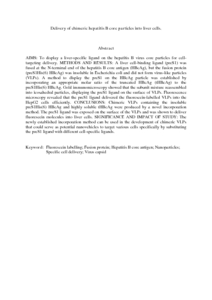Citation
Tan, Wen Siang and Tey, Beng Ti and Ho, Kok Lian and Lee, Khai Wooi
(2012)
Delivery of chimeric hepatitis B core particles into liver cells.
Journal of Applied Microbiology, 112 (1).
pp. 119-131.
ISSN 1364-5072
Abstract
AIMS:
To display a liver-specific ligand on the hepatitis B virus core particles for cell-targeting delivery.
METHODS AND RESULTS:
A liver cell-binding ligand (preS1) was fused at the N-terminal end of the hepatitis B core antigen (HBcAg), but the fusion protein (preS1His(6) HBcAg) was insoluble in Escherichia coli and did not form virus-like particles (VLPs). A method to display the preS1 on the HBcAg particle was established by incorporating an appropriate molar ratio of the truncated HBcAg (tHBcAg) to the preS1His(6) HBcAg. Gold immunomicroscopy showed that the subunit mixture reassembled into icosahedral particles, displaying the preS1 ligand on the surface of VLPs. Fluorescence microscopy revealed that the preS1 ligand delivered the fluorescein-labelled VLPs into the HepG2 cells efficiently.
CONCLUSIONS:
Chimeric VLPs containing the insoluble preS1His(6) HBcAg and highly soluble tHBcAg were produced by a novel incorporation method. The preS1 ligand was exposed on the surface of the VLPs and was shown to deliver fluorescein molecules into liver cells.
SIGNIFICANCE AND IMPACT OF STUDY:
The newly established incorporation method can be used in the development of chimeric VLPs that could serve as potential nanovehicles to target various cells specifically by substituting the preS1 ligand with different cell-specific ligands.
Download File
![[img]](http://psasir.upm.edu.my/23439/1.hassmallThumbnailVersion/Delivery%20of%20chimeric%20hepatitis%20B%20core%20particles%20into%20liver%20cells.pdf)  Preview |
|
PDF (Abstract)
Delivery of chimeric hepatitis B core particles into liver cells.pdf
Download (84kB)
| Preview
|
|
Additional Metadata
Actions (login required)
 |
View Item |

